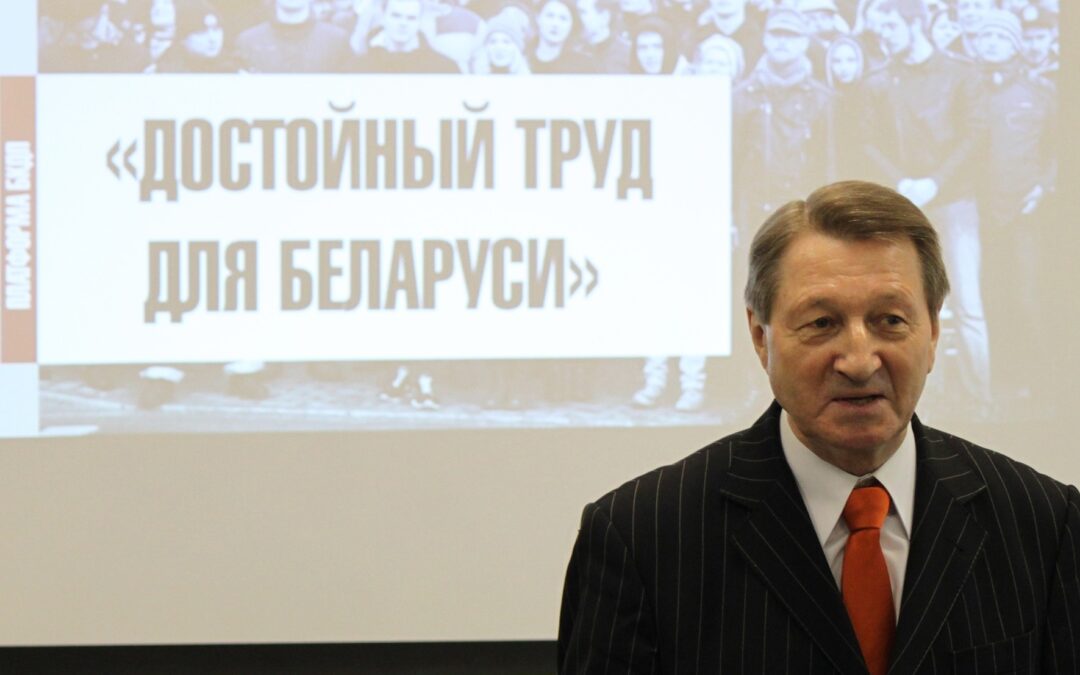
Dec 5, 2022
In the wake of a new wave of prison sentences against union leaders and other activists arrested earlier this year, new Belarus worker rights organization Salidarnast is tracking and disseminating updates on union political prisoners’ legal cases, and providing other worker rights news.
Belarusian Congress of Democratic Trade Unions (BKDP) President Aliaksandr Yarashuk, jailed since April and facing 14 years in prison, was elected in absentia to an ITUC vice-presidency at the organization’s 5th World Congress last month, reports Salidarnast.
Other updates include:
- Extraordinary mistreatment of two jailed union leaders, Leanid Sudalenka and Volha Brytsikava, for which Brytsikava reportedly started a hunger strike on November 8 and was released last week after having spent more than 105 days behind bars this year–including 75 consecutive days in the spring
- Continuation of a ten-person trial associated with worker organization Rabochy Rukh for which the accused are facing prison sentences of up to 15 years for high treason, among other charges
- Grodno Azot fertilizer factory worker and chairperson of the independent trade union there, Andrei Khanevich, whose phone was tapped by Belarusian special service, sentenced to five years in prison for speaking with a BelSat TV reporter
- Belarusian Independent Trade Union (BNP) Vice Chairperson and Chairperson of the Local Trade Union at Belaruskali fertilizer factory, Aliaksandr Mishuk—detained since May—sentenced to two and a half years’ imprisonment
- Free Trade Union of Metalworkers (SPM) Deputy for Organizational Work Yanina Malash—mother of a minor child and detained since April—sentenced to one and a half years’ imprisonment
- Vital Chychmarou, a former engineer fired in 2020 for trade union activities and manager of an SPM organization, sentenced to three years of home confinement
- Free Trade Union of Metalworkers (SPM) Trade Union Council Secretary Mikhail Hromau—detained since April—sentenced to two and a half years of home confinement
- Genadz Bedzeneu, who attempted to start a local union for Polotsk stall market workers, arrested.
Salidarnast is filling an information void created after the Lukashenko government in July forcibly shut down the BDKP and its affiliates, compounded by the detention of dozens of journalists and media workers with other civil society defenders. The number of political prisoners in Belarus stood at almost 1,500 in November, reports the European Federation of Journalists (EFJ); up from 1,000 in February. The Belarus Supreme Court in July dissolved the BKDP and its four affiliates: BNP, the Union of Radio and Electronics Workers (REP), Free Trade Union of Belarus (SPB) and SPM.
Salidarnast on December 1 flagged the arrest of at least five people at the Miory steel plant, warning of imprisonment risk for up to ten thousand people who contributed to the “Black Book of Belarus” which identified riot police.
“Despite the destruction of the independent trade union movement, workers in Belarus remain the force which can resist the dictatorship,” says Salidarnast.
The repression and eventual dismantling of the independent Belarus union movement began after hundreds of thousands of people, often led by union members , many of them women, took to the streets in 2020 to protest elections in which President Alexander Lukashenko declared himself winner in a landslide victory amid widespread allegations of fraud. The BKDP—the first Belarus union to be independent of government influence in the post-Soviet era—was founded 29 years ago and has been a member of the International Trade Union Confederation (ITUC) since 2003.
Hear more about workers’ fight for freedom by listening to a Solidarity Center podcast interview in which now-imprisoned BDKP Vice President Sergey Antusevich in 2021 spoke passionately about workers taking to the streets in defense of democracy. Antusevich has been jailed pending trial since April 2022.
(You can support jailed Belarusian union leaders—take action here).
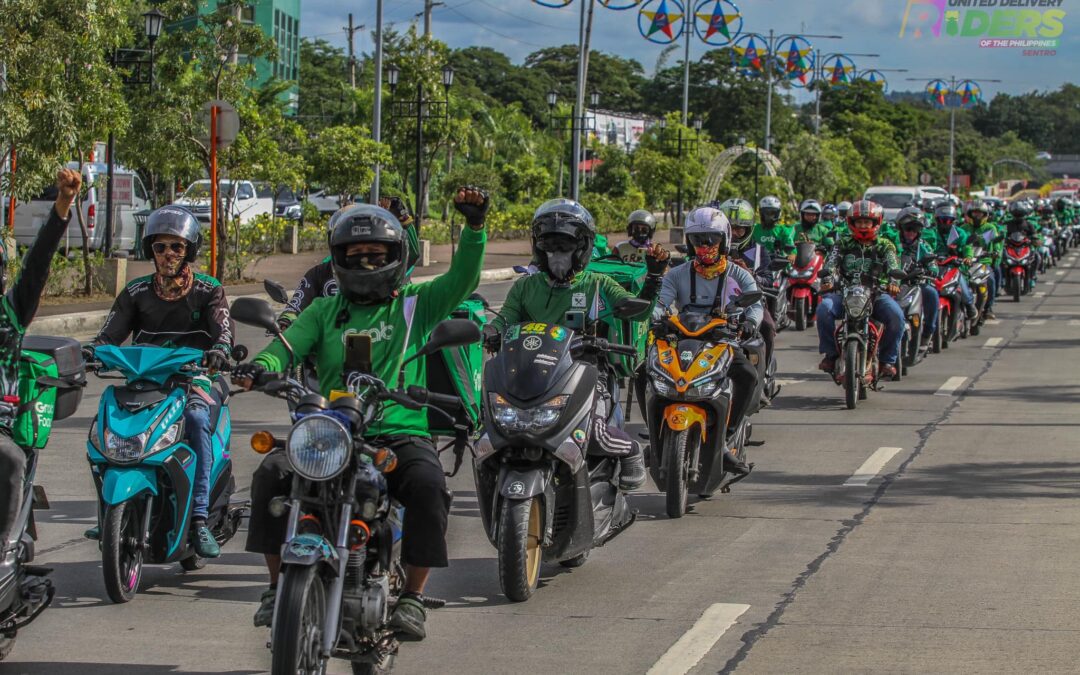
Nov 29, 2022
More than a hundred Grab food delivery riders launched the Iloilo Grab Riders Union (IGRU) in Iloilo City, Philippines, on November 24, then staged a unity ride around the city, located on Panay Island. Some 200 drivers joined in the ride, with more riders taking part from the streets, organizers said. The newly formed union’s demand is for just fares, paid sick leave and other social protections, and union recognition.
“The increasing price of gasoline and of commodities and the decrease in base fare delivery fees makes Grab riders work twice their normal hours to get the same wage they earned before the pandemic,” Archie, one of the Grab drivers who helped organize IGRU, said on the local radio show DZRH News. Archie is also a member of the Partido ng Manggagawa (Labor Party).
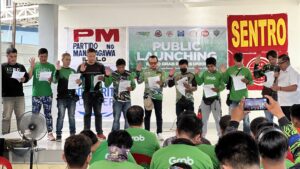
Photo Credit: Solidarity Center/Andreanna Garcia
Preceding the launch of IGRU, gig drivers from Grab and other platforms such as Food Panda and Maxim had begun to form unions across the Philippines. On August 15, some 300 delivery riders from General Santos City organized under the union, United Delivery Riders of the Philippines (RIDERS). RIDERS is composed of delivery riders from Food Panda, Maxim and Grab. Unity rides have also been conducted in the cities of General Santos and Cebu. Elsewhere in the country, local chapters of RIDERS also have begun to organize.
Their aim is to formally establish the United Delivery Riders of the Philippines (RIDERS) as the national union for the riders. “During the pandemic, when Grab suspended the GrabCar service, Grab food delivery drivers became the lifeline of the company. Is it wrong to ask them to be fair?” asked John Jay, a multi-app driver and organizer from Metro Manila. He attended the IGRU launch to express support for his fellow Grab drivers.
In addition to the decrease in earnings, delivery drivers in the Philippines have little or no job security or basic benefits as they are part of the gig economy. Under Philippine labor laws, delivery riders are classified as “independent contractors,” which does not provide an employee-employer relationship. As gig economy workers, delivery riders are not entitled to social protections such as health insurance and income security, among other basic protections.
“Our interests will be protected only through the passing of laws,” said Mark, a driver and organizer from Pampanga. Like John Jay, he also traveled to Iloilo to share a message of solidarity for his fellow riders.
Philippine Senator Risa Hontiveros proposed the Protektadong Online Workers, Entrepreneurs, Riders at Raketera (POWERR) Act, which would protect workers in the gig economy. A committee currently is working on the bill.
The IGRU launch was supported by the Solidarity Center, the global union IUF, RIDERS, the Center of United and Progressive Workers (SENTRO), Partido ng Manggagawa (Labor Party) and the Brotherhood of Two Wheels (Kagulong).
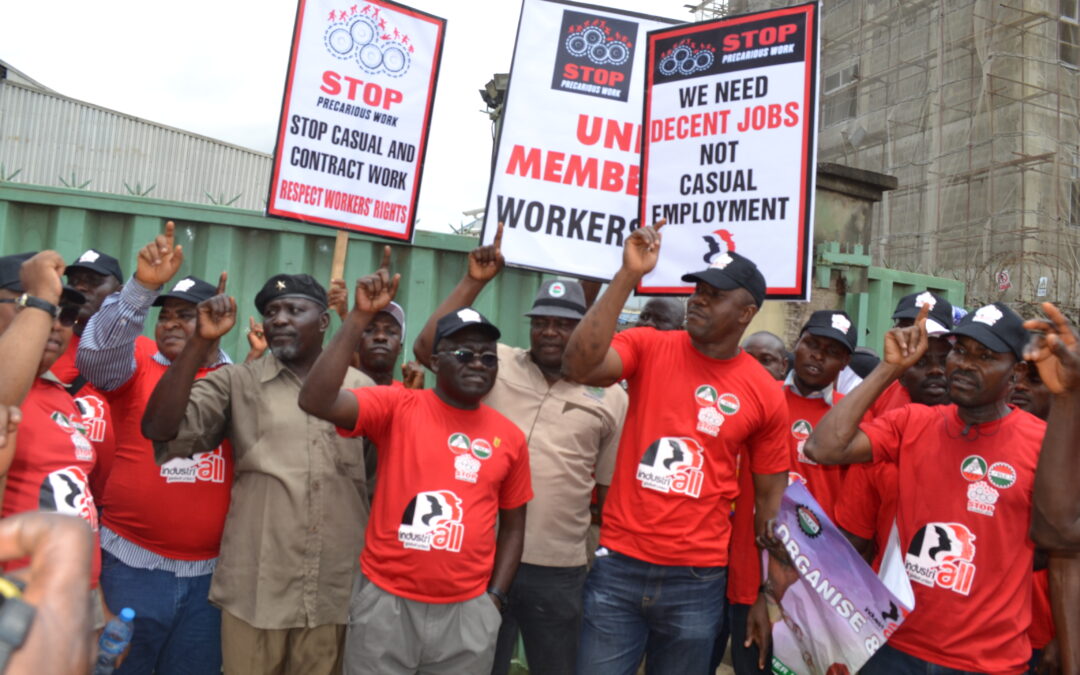
Oct 27, 2022
The African Continental Free Trade Area (AfCFTA) was sold with the promise to “promote and attain sustainable and inclusive socioeconomic development, equality and structural transformation.” However, many governments’ failure to engage civil society partners, including the labor movement, as they begin to develop national strategies and plans for implementation of the agreement means that the rights of working people are not being effectively represented or protected, and their access to decent work is therefore imperiled.
“Unions in my country are not fully aware of the AfCFTA,” says Sierra Leone Labor Congress (SLLC) Secretary General Max Conteh.
Similarly, trade unions in Mali are yet to familiarize themselves with the agreement and its provisions, says Union Nationale des Travailleurs de Mali (UNTM) General Secretary Seydou Diarra.
In Burkina Faso, “[W]e were not consulted,” says Confédération Nationale des Travailleurs de Burkina (CNTB) Secretary General Augustin Blaise Hien—adding that the AfCFTA is not well synchronized with the country’s existing national plans. AfCFTA creates the largest free trade area in the world measured by the number of countries participating, connecting 1.3 billion people across 55 countries with a combined gross domestic product (GDP) valued at $3.4 trillion. The agreement, which was ratified by the required number of countries in 2019 and came into force last year, is designed to increase intra-African commerce through trade liberalization and enhanced regulatory harmonization and coordination across African states—including a process that will gradually eliminate tariffs on 90 percent of goods.
AfCFTA has potential to raise all boats, including through harmonization of member countries’ labor provisions with international standards. However, unions say that without their participation as advocates for workers’ interests as implementation moves forward, worker rights protections and the shared prosperity promised by agreement proponents—including business and governments—are far from assured.
For example, worker rights and safety improvements cannot be realized under provisions of the AfCFTA until the region’s governments improve current labor laws—or their enforcement systems—say unions. Niger’s current mechanism for applying labor rights, such as labor inspections, does not yet present enough guarantees, says Union Syndicale des Travailleurs du Niger (USTN) Secretary General Alain Adikan. And, in Ghana, lack of resources detracts from the ability of various government agencies to promote and protect the rights of workers and their unions, says Ghana Trades Union Congress (GTUC) Labor Research and Policy Institute Deputy Director Prince Asafu-Adjaye.
And say some West African unions, tighter rules are needed to protect African markets. Countries that import more than they export, like Niger, are potentially disadvantaged under certain provisions of the AfCFTA agreement, says Adikan.
“[It] could lead to enormous losses for a country like ours due to the removal of customs barriers… and can have dire consequences on the purchasing power of workers,” he says.
Inclusive socioeconomic development requires decent work, says the International Labor Organization (ILO). The four pillars of the ILO Decent Work Agenda—employment creation, social protection, rights at work and social dialogue—are therefore integral elements of the UN’s 2030 Agenda for Sustainable Development.
With Solidarity Center support, the Organization of Trade Unions of West Africa (OTUWA) is developing and sharing a regional position paper on how to address worker rights and promote a decent work agenda within the continental agreement—with participation of the Federation of African Journalists—to educate the public on what is at stake. With its members, OTUWA is focused on mobilizing civil society organizations to better protect consumers’ and working people’s interests as implementation proceeds.
This month eight countries—Cameroon, Egypt, Ghana, Kenya, Mauritius, Rwanda, Tanzania and Tunisia—launched the Guided Trade Initiative. The first products to be traded under AfCFTA include ceramic tiles, coffee, corn starch, processed meat products, sugar and tea.
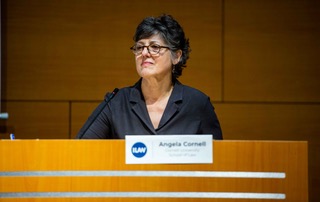
Oct 9, 2022
As the world witnesses some of the greatest challenges to democratic governments since the 1930s, unions offer a strong and essential counter to the trend, according to Cornell University Professor Angela Cornell.
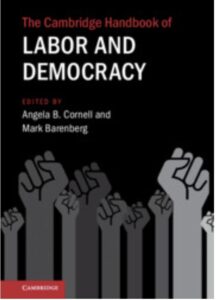 “Many studies show that organized labor has played critical role in developing and defending democracy. The organized working class was the primary carrier of democracy,” Cornell said today at the International Lawyers Assisting Workers Network (ILAW) Conference opening plenary.
“Many studies show that organized labor has played critical role in developing and defending democracy. The organized working class was the primary carrier of democracy,” Cornell said today at the International Lawyers Assisting Workers Network (ILAW) Conference opening plenary.
Cornell, co-editor of The Cambridge Handbook of Labor and Democracy, along with several book contributors, opened the Conference’s third and final day with a discussion of the handbook, an interdisciplinary and cross-regional anthology. (Hear Cornell and ILAW Board member Mery Laura Perdomo discuss unions and democracy on a recent Solidarity Center Podcast.)
More than 130 labor lawyers from 42 countries meeting October 7–9 also focused their final day on developing plans for Network’s coming years.
The Solidarity Center launched the ILAW Network in December 2018 as a global hub for worker rights lawyers to facilitate innovative litigation, help spread the adoption of pro-worker legislation and defeat anti-worker laws.
Unions Fuel Democracy
More than one quarter of the world’s population now live under democratically backsliding governments, including some of the world’s largest democracies.
Cornell listed the ways in which unions fuel democracy, including by providing a counterviling role to corporate power.
Further, said Cornell, “new research on the role of unions and in building solidarity among their members demonstrates the ways in which unions can bridge racial and national divides. Union members are less likely to support extreme views.”
Economic inequality is a destabiizing influence in most countries, Cornell said, and unions decrease inequality.
“Unions have been instrumental in the passsage of labor protections and the social safety net, including social security, minimum wage and overtime, workplace heath and safety and medical leave, among others.”
Unions Build Democracy in Latin America, Africa
Ken Roberts, a professor at Cornell University and book contributor, overviewed how unions have been bulwarks of democracy throughout Latin America.
“Labor has played a central role in trying to restore citizenship rights,” said Roberts. Since the 1960s–1980s, when unions suffered setbacks during military dictatorships and neoliberal reforms that prioritized the interests of the wealthy over working people, the key challenge has been to build broad coalitions, he said.
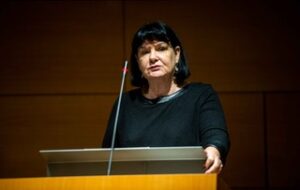
ITUC General Secretary Sharan Burrow
By joining with other movements, indigineous communities and territorially-based urban community networks, unions have created strong and successful coaltions. Since late 1990s as part of social pushback against neoliberal model, 14 countries have elected progressive governments and labor has been an important part of moving this unprecedented number of elections, he said.
Most recently, unions were part of successful coalitions that elected progressive governments in Honduras and Colombia and are constructing broad democratic fronts against new challenges from ethnonationalist and extreme conservative groups.
In Africa, “more often than not, unions were the only force fighting decolonization,” said Evance Kalula, chair of International Labor Organization (ILO) Committee on Freedom of Association and emeritus prof of law at the University of Capetown. “Formal and informal collaboration between unions as agents of change and nationalist movements.”
Kalula and co-author Chanda Chungu, contributed the chapter on “African Perspectives on Labor Rights as Enhancers of Democratic Governance.”
Julia Lopez Lopez, a professor at the University of Barcelona, described how unions are standing up to corporations that are using the new model of app-based work to exploit transportaton workers.
“The case of transport sector is one of the cases that show unions are trying to create new strategies against market intervention against multinational efforts to liberalize labor rights,” she said.
Lopez recently participated in research projects on precarious work and social rights led by the Working Lives Research Institute.
Closing the Conference, Sharan Burrow, general secretary of the International Trade Union Confederation (ITUC), overviewed the challenges facing workers and their advocates and pointed to recent legal successes as well, including an agreement that the ITUC and ILO achieved with the Qatar government that ensures more rights for migrant workers, including the freedom to leave their jobs and seek alternative employment.
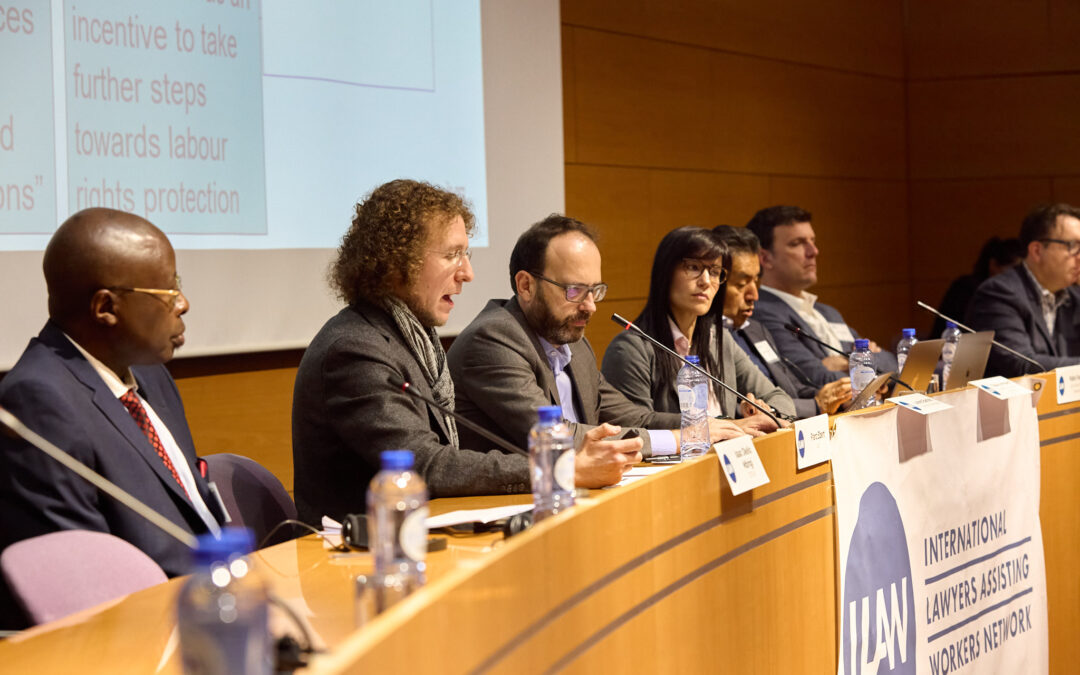
Oct 8, 2022
Participants in the afternoon plenary at the International Lawyers Assisting Workers Network (ILAW) Global Conference heard updates on how trade agreements are advancing worker rights and learned strategies for incorporating forced labor bans and protecting workers’ freedom to form unions.
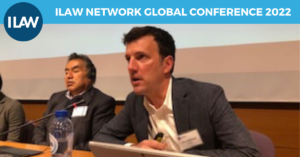
Eric Gottwald, AFL-CIO
With a focus on the United States-Mexico-Canada Agreement (USMCA), Eric Gottwald and Pablo Franco opened the panel on Trade and Labor Law Developments by describing how the 2020 agreement benefits workers.
The USMCA’s Rapid Response Mechanism was a game-changer, said Gottwald, an attorney at the AFL-CIO. The mechanism addresses freedom of association and collective bargaining violations down to the company level.
“Anyone can file a claim against a specific facility and there is an investigation and remedy that reach down to company level in way trade agreements never had before,” he said.
USMCA, which replaces the North American Free Trade Agreement (NAFTA), is especially helpful in furthering new Mexican labor law reform that seeks to dismantle the endemic union protection contract system that does not benefit workers, Gottwald and Franco said.
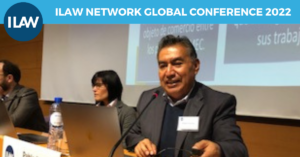
Pablo Franco. Credit: Solidarity Center
More than 130 labor lawyers from 42 countries are meeting in Brussels October 7–9 for the second global conference of the International Lawyers Assisting Workers (ILAW) Network, where members set an ambitious agenda for advocacy, litigation and education.
The Solidarity Center launched the ILAW Network in December 2018 as a global hub for worker rights lawyers to facilitate innovative litigation, help spread the adoption of pro-worker legislation and defeat anti-worker laws.
Strategies for Addressing Forced Labor Through Trade
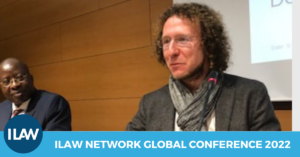
Franz Ebert, ILO. Credit: Solidarity Center
Since 2016, forced labor has increased globally from 25 million to 27 million people, with the majority in the private sector as state-imposed forced labor has decreased, said Franz Ebert, from the International Labor Organization (ILO).
“Forced labor is a structural phenomenon to exploit workers,” he said. Concentrated corporate power and ownership, outsourcing, governance gaps and irresponsible sourcing practices combine with poverty, discrimination and limited worker rights protections so that it is clear forced labor does not occur randomly but can be traced to root causes.
Ebert reviewed western countrie’s efforts to include forced labor bans in treaties, including the European Union which is proposing a Forced Labor Trade Ban that would prohibit sale of all goods made with forced labor: imported goods, goods for export and EU goods for domestic consumption Implementation would be entrusted with member states authorities.
In the United States, Ebert noted that application of the U.S. Forced Labor Clause is increasting traction, with 43 forced labor enforcement actions between 1991 and 2018 and 32 between 2019 and 2021.
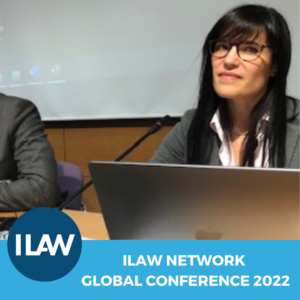
Tibisay Morgandi, WTO. Credit: Solidarity Center
While the World Trade Organization (WTO) may not appear as a likely avenue to support labor rights, said Jeffrey Vogt, panel moderator, panelists Lorand Bartels and Tibisay Morgandi offered strategies for moving forced labor bans through the WTO.
Bartels, a professor of international law at Cambridge University, compared the U.S. and EU approaches to blocking goods made by forced labor through trade, with an eye to WTO approval of such bans.
After outlining a series of options for worker rights advocates seeking to pursue trade bans on goods made with forced labor through the WTO, Morgandi concluded that citing a authoritative outside source is likely the most effective option.
“ILO body determines goods are made with forced labor, you show the measure, and your measure is ipso facto justified,” she said.
Closing out the panel, Isaac Okello Mbingi from the Central Organization of Trade Unions–Kenya, described how the new continent-wide African free trade agreement (African Continental Free Trade Area) covers a market of 1.2 million people in countries with a combined GDP of $3 trillion—yet does not include labor protocols to protect worker rights. The agreement will be difficult to modify, he said, but the process must start with educating unions and their members on how trade agreements impact worker rights.
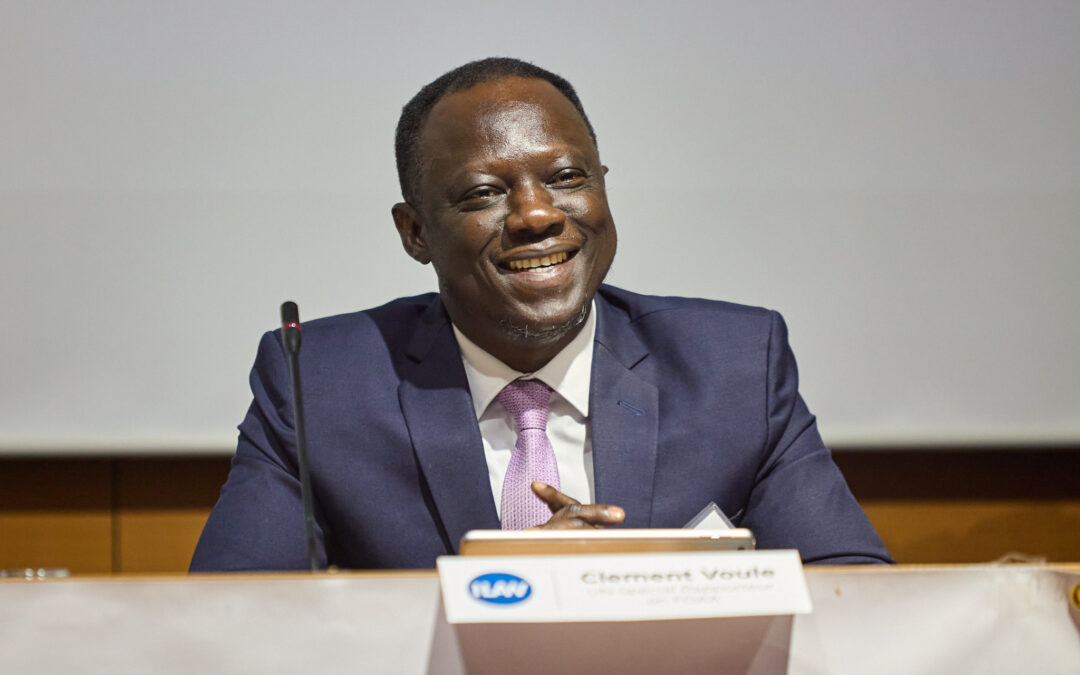
Oct 8, 2022
As governments and employers move to address the effects of the climate crisis and toward a sustainable future, workers and their unions must be part of the discussions to ensure the creation of decent jobs and respect for workers’ fundamental rights, panelists said today in the opening plenary of the International Lawyers Assisting Workers Network (ILAW).
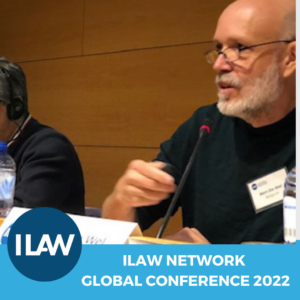
Bert De Wel, ITUC. Credit: Solidarity Center
Panelists in the Right to a Just Transition plenary sought to explore how workers can bargain with employers and governments over adaptation mitigation measures to transform economies in a way that “does not undermine worker rights but that does the opposite—builds a new economy that’s better than one we have today, one that incorporates all the social protections we have been fighting for,” said Jeffrey Vogt, Solidarity Center Rule of Law director and ILAW chair.
The term “just transition” signifies a process based on fairness, rights for workers and their communities, said Bert De Wel, an economist at the International Trade Union Confederation, which included it as part of global trade union demands in the ITUC New Social Contract.
More than 130 labor lawyers from 42 countries are meeting in Brussels October 7–9 for the second global conference of the International Lawyers Assisting Workers (ILAW) Network, where members set an ambitious agenda for advocacy, litigation and education.
The Solidarity Center launched the ILAW Network in December 2018 as a global hub for worker rights lawyers to facilitate innovative litigation, help spread the adoption of pro-worker legislation and defeat anti-worker laws.
The Climate Crisis: A Worker Rights Issue
“Trade unions have played a special role in adapting and transforming to a greener and more sustainable future,” said Clément Voule, special rapporteur on the Rights to Freedom of Peaceful Assembly and of Association for the United Nations. Voule cited the example of unions in the Philippines taking a key role in the transition to clean energy within a just transition framework.
“A sustainable future will only come true if states harness the power of civil society, including unions, to ensure those fighting for climate justice receive the respect they deserve, including peaceful freedom of assembly and association,” Voule said.
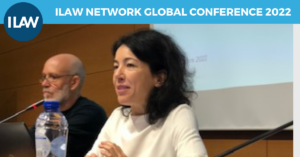
Claire LaHovary, ILO Actrav. Credit: Solidarity Center
The ITUC has incorporated the notion of just transition as part of its New Social Contract, said De Wel, while standards set by the International Labor Organization (ILO) offer worker rights lawyers a framework for moving to a just transition, said Claire LaHovary with ILO Bureau for Workers’ Activities (ACTRAV).
LaHovary outlined applicable ILO standards and resolutions, including Resolution 205 on Employment and Decent Work for Peace and Resilience Recommendation (2017) that, in part, addresses the need to consider “the impact and consequences of conflicts and disasters for poverty and development, human rights and dignity, decent work and sustainable enterprises. The ILO also created a user’s manual to the ILO’s Guidelines for a just transition towards environmentally sustainable economies and societies for all, a key tool for worker rights advocates.
Two Solidarity Center staff offered grassroots view of the challenges ensuring worker voices are heard in sustainable transition discussions, including the need to educate workers about how the effects of the climate crisis on their livelihoods and health.
In Bangladesh, which has been identified as the seventh most vulnerable country to climate change, worker awareness of the issue is minimal, said AKM Nasim, Solidrity Center Bangledesh director.
“The Solidarity Center is trying to raise capacity of unions to negotiate agreements addressing climate change,” he said, but worker face strong resistance from employers on so many other workplaces issues their unions often are struggling to survive.
Carlos Gaurnizo at the Solidarity Center in Colombia, described the difficulties of shifting to a sustainable model from an extractive economy while ensuring worker rights. One key is to connect unions with the diverse groups affected by the climate crisis, he said.
“We have been working with communities and trade unions and work with all the international movements,” he said. It is also essential to consider cultural differences, including those of Indigenous communities that have a closer relationship with nature, he said. The recent election of a government that supports sustainable policies has opened new avenues for progress, he said.
“We need an ecological vision so we can understand we are only one small part of nature. We need to live together and co-exist harmoniously.”
Innovations in Arbitration
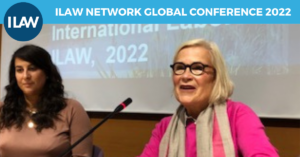
UNI Global Union General Secretary Christy Hoffman. Credit: Solidarity Center
At the second plenary panel, International Arbitration for Labor Rights, UNI Global Union General Secretary Christy Hoffman, Katerina Yiannibas at the Columbia University School of Law, discussed unique innovations in the arbitration process that better address the needs of workers and others seeking remedy.
Following the negotiation of the legally-binding Bangladesh Accord on Fire and Buiding Safety with fashion brand corporations to protect garment worker rights, UNI and IndustriALL moved to streamline the arbitration process to better serve workers, said Hoffman. The new framework reduces time to 180 days in part by combining arbitration and concilliation.
Yiannibas described the Model Arbtration Clauses for the Resolution of Disputes under Enforceable Brand Agreements 2020 that advances a streamlined arbitration system with a rapid timeline that protects impartiality and due process while avoiding excessive litigiousness, promoting transparency, alleviating burdensome costs, and providing final and binding enforcement.
Yiannibas and worker rights attorney Lance Compa led the team of lawyers who created the model dispute resolution system, which was narrowed down from the Hague Rules on Business and Human Rights Arbitration that Yianniba spearheaded in 2019.






 “Many studies show that organized labor has played critical role in developing and defending democracy. The organized working class was the primary carrier of democracy,” Cornell said today at the International Lawyers Assisting Workers Network (
“Many studies show that organized labor has played critical role in developing and defending democracy. The organized working class was the primary carrier of democracy,” Cornell said today at the International Lawyers Assisting Workers Network (








